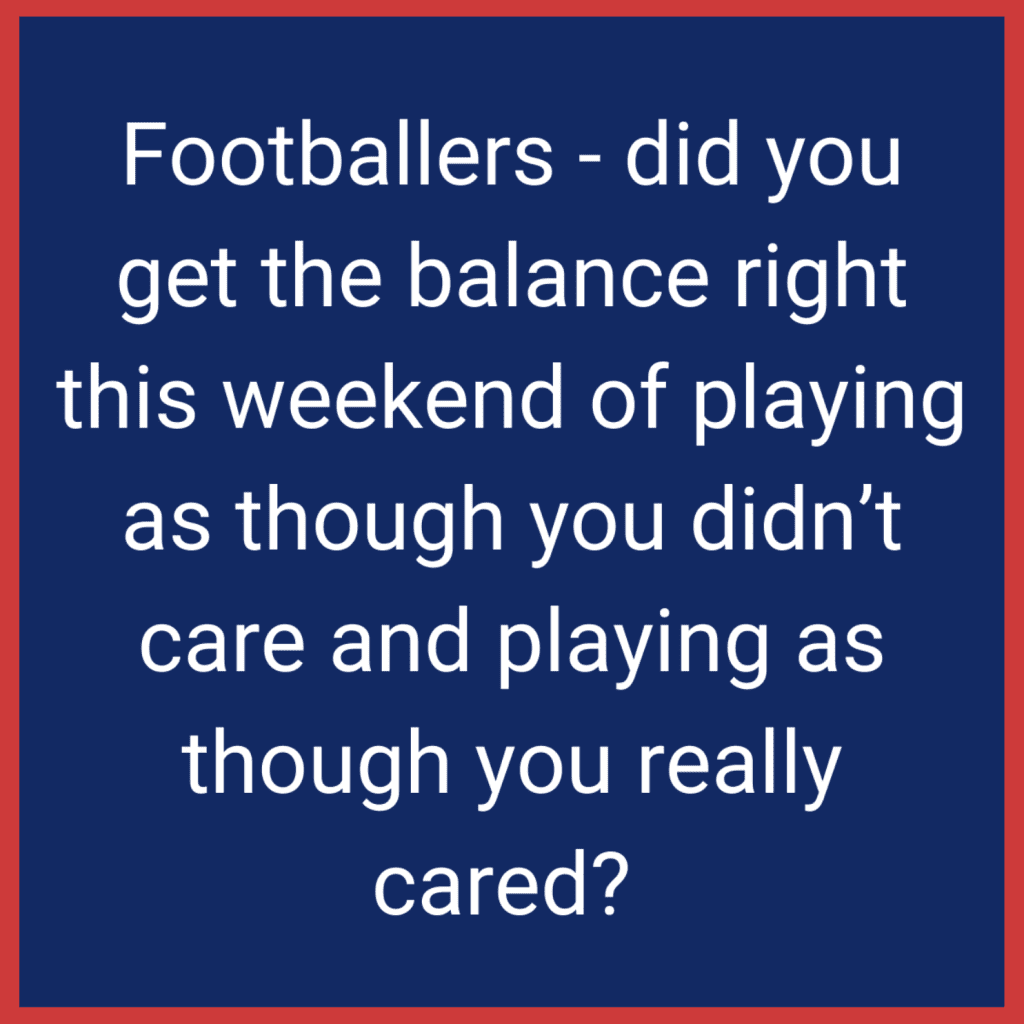06 March 2024

Developing The X-FACTOR To Transform Your Football Performances
How To Quieten The Mind On The Football Pitch
Typically, when we see a top professional footballer, like, Real Madrid and England midfielder, Jude Bellingham perform at their best we marvel at their skills and strength that they display. When questioned about their focus or mindset on the pitch, the player is likely to say they weren’t thinking about a great deal or that they had a “quiet mind” and simply reacted to situations.
What does it mean to have a “quiet mind”?
In general, footballers who play with a quiet mind are on autopilot, they’re in the moment and simply concentrating on a single cue.
Now consider the opposite of a quiet mind. What happens when you’re struggling?
Football or soccer players will say that their mind is busy. That they have lots of thoughts flying around their head. Often they’re caught going back and forth between the “past” and “future”. Thinking about past performances, poor decisions or mistakes that they’ve made. Worry and frustration then often creep in. Self-doubt is another issue where the footballer begins doubting themselves thinking what may happen when they next get on the ball. In short, they are in judgement mode, forming judgements of themselves and their opponents and predicting the future.
How can a footballer stop an overactive mind?
As I have alluded to, when a footballer has a “quiet mind” they are not thinking about anything, their mind and body are working together, in tandem.
‘The Two Selves’
Think about your brain being composed of two selves: Self 1 and Self 2. You can think about Self 1 as your egotistical mind and Self 2 as your body (nerves, muscles, brain….). When Self 1 is playing you may have been finding it difficult to find a team-mate with passes or your shooting boots may have been left at home! Your coach might be in your ear, that you need to wake up and improve fast. They might worry that you’re a liability and aren’t helping your team-mates by the decisions that you’re making. If you take in all of these cues when you’re playing, your mind is going to be cluttered and the likelihood is you may start to doubt yourself. Self 1 (the egotistical mind) then kicks into gear forming judgements e.g. ‘I’m having a nightmare,” “he’s going to sub me” or “I can’t believe we’re getting beat off these.” Then often what happens, these judgements mean a footballers natural timing goes off, your body and legs feel heavier and more sluggish and you may find yourself fluctuating between angry (at yourself) and wanting the match to end.
As you’re reading this your body (self 2) is doing something special. Without any thought, your body is working in combination with your mind, your heart will be beating, your eyelashes blinking, you’ll be breathing, your eyes will likely be moving following the letters and words on the screen… all without thinking.
Why should this be any different when you’re on the pitch?
Why can’t you simply trust your body to execute particular skills?
Because self 1, the ego, keeps casting judgements, which go on to prevent your body to do what you’d like it to do. For instance, when playing we can sometimes see positive images in our heads and as a result we learn to trust our body. You may see yourself, threading a ball through the eye of a needle to the centre forward a split second before you actually do it.
Recently, a striker approached me to support him for the second half of the season so that he could get back on track. In our conversations it was easy to spot that he was very visual in his learning style. He’d often say, “I see….” Or “I had a vision that… would happen.” If you consider as a youngster, you unconsciously model your parent’s behaviours, the way they walk and carry themselves. The way they smile or frown too! Images in your mind are very powerful.
In one of our sessions on the football pitch, the client discussed a recent match where he’d been caught on the ball when he had the goal at his mercy and the opponents stole the ball, broke quickly and scored. His ego mind (Self 1) was making judgements “what have I done”, “the coach is going to go nuts” and “I want this game to finish NOW.”
I then got a bag of balls out and he kicked some shots towards the goal, he started off placing them with the instep towards the bottom left corner. I asked him what he felt like. We then altered the way he shot towards the goal using his laces and going for power in the top left corner of the goal. Again, I searched for meaning from him, when he struck the football hard. He talked openly about the feeling on his boot and the anger burning inside him to score. He talked about Harry Kane and how he struck the ball at his best. We rehearsed in his mind what he was going to do with the next 5 balls, where on his foot he’d stroke the ball, what it would feel like, the sound of the ball leaving his boot and hitting the net. Gone was any overthinking. He’d immersed himself in the task in hand.
In further sessions, we worked hard on improving the images in his head. He’d see himself bullying defenders, playing positive through balls, moving his marker about and making an opponents life a misery. We got to the point where his Self 1, his ego had been parked, it did not interfere in anyway with what he wanted his body to do. He trusted 100% that his body would take over and that he could execute what he wanted to do.
This laid the foundations for further work, where in detail we looked at a variety of situations, defenders and opponents he came up against. He took visualisation into training sessions and used them as mental reps so that he could let go of any judgements and back himself no matter what on the pitch.
To sum up, visualisation is a skill that any football or soccer play can learn and develop. When you get good at it, and when you make it part of your regular training and performance routines it makes quietening the mind far easier.
You may also want to listen to the most recent DEMYSTIFYING MENTAL TOUGHNESS PODCAST to help you with quietening your mind:
It’s very easy to get in your own way by judging the magnitude of the task that you are about to carry out or to get caught up mindreading others, rather than concentrating on yourself and what you need to do.
“Using a one ball at a time mentality focusing on making the next moment and making it as high quality as you can.”
This statement informs a small part of great chat I had with former international cricketer and Senior Leadership Coach, Jeremy Snape about dealing with pressure. It may not be football or soccer specific however he offer hugely valuable advice.
WORD OF THE DAY
Trust
After googling trust I came across the following definitions “a firm belief in the reliability, truth, or ability of someone or something.” “A assured reliance on the character, ability, strength, or truth of someone or something.” Some key words also featured including certainty, belief, faith and commitment.
My take on this is that to be able to trust your skills, you simply have to play by instinct and be reactive. It’s where footballers let their skills happen and trust their practice and training. This approach means that there is not a great deal of thought that takes place, that you get out of your own way and DO NOT consciously try to control your movements.
CHECK US OUT ON INSTAGRAM WHERE YOU’LL FIND IMAGES AND POSTS LIKE THIS

⚽️ So footballers did you get the balance right this weekend of playing as though you didn’t care and playing as though you really cared?
What do I mean by this question!
🦁 🧠 It is possible to play without any care of the outcome. To play with freedom. To be brave when communicating or when taking a player on. Whilst playing to win.
👎 It is possible to care too much, so much that your legs feel heavy, your brain feels foggy and you freeze with fear.
👎 It’s possible to be care-ful with your every touch, move and every pass.
👎 It’s possible to be carefree and careless, taking risks in silly places. Showboating and not respecting your opponents.
What was it for you this weekend?
TO DO LIST:
WATCH – How to Stop Overthinking in Sport (3 EASY Tips) | Sam Martin
LISTEN – Ep269 The Sport Psych Show: Dr Paul Mansell & Dr Katie Sparks – Performing Under Pressure
READ – Expertise and perceptual-cognitive performance in soccer: Casanova et al.,
FACT – When footballers DON’T play with trust and a quiet mind they often fall into the trap of trying to play “perfect football”, they’re frightened of making mistakes, they can often try too hard and over-analyse their performances on the pitch.
TIP – Seek to identify where you lose trust in yourself and your skills as a footballer and overthink. Is it when you’re given a new role in the team? If you’re a striker – is it after you’ve missed some chances and try too hard simply to hit the target? If you’re a goalkeeper can indecision on crosses cause you an issue? Or maybe trying to impress coaches, scouts, parents, family or friends is a problem for you?
QUOTE – “Only those who have the courage to take a penalty miss them” – Roberto Baggio

THOUGHTS – If you strip this quote back, it most definitely comes from a footballer who had trust in his ability. A footballer who was able to calmly and rationally decide he wanted to take penalties. Then when it came down to the execution, his mind did not play tricks on him.
The fact Baggio mentions being courageous is a good thing too. when you look to be courageous when taking penalties, You’ll visualise vividly where you want to place the ball and won’t be consumed by thoughts of putting the ball over the bar or wide of the posts
SHARE THE X-FACTOR
Share The X-FACTOR with your friends, family and colleagues, and create a positive difference to the lives of more football players, coaches, parents and enthusiasts.

Best Wishes
David Charlton
Online Sports Psychologist | Mental Performance Coach who supports many highly motivated athletes, young and old, developing their skills or who are already highly skilled so that they gain a mental edge and get the most from their talent across the globe from USA/Canada to Great Britain and Ireland to UAE, South Africa, Australia and New Zealand, using ONLINE Video Conferencing.
Managing Director – Inspiring Sporting Excellence
Host of Demystifying Mental Toughness Podcast
Founder of The Sports Psychology Hub
Author of The Mental Edge
With over a decades’ experience supporting athletes, coaches, parents and teams to transfer their skills from training to competitive situations, under pressure.
T: +44 7734 697769






